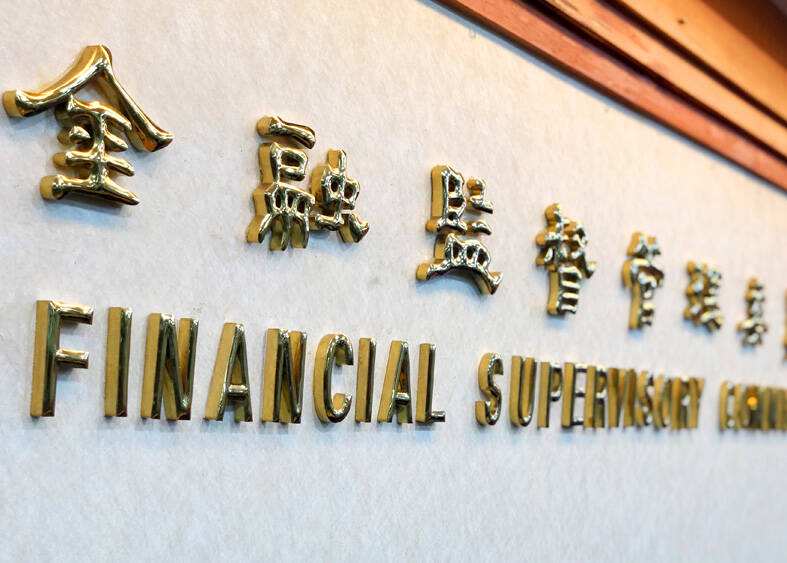The nation’s financial holding companies reported record-high unrealized losses of NT$873.2 billion (US$28.66 billion) during the second quarter, as the value of their investment assets plunged amid market routs sparked by the US Federal Reserve’s cycle of rate hikes, data from the Financial Supervisory Commission (FSC) showed on Monday.
Combined unrealized losses in the first half of this year came in at NT$827.76 billion — NT$661 billion from overseas investments and NT$166 billion from domestic investments, the data showed.
The majority of their losses came from investments in the US, which totaled NT$256.5 billion at the end of June, compared with unrealized losses of NT$38.4 billion at the end of March, the data showed.

Photo: Kelson Wang, Taipei Times
Financial holding companies’ investments in the US increased by NT$503 billion in the second quarter, mainly because local life insurance companies bought more US fixed-income products, the data showed.
China was the second biggest source of losses, with the financial holding firms reporting aggregate losses of NT$53.1 billion, followed by France with losses of NT$31.7 billion, Russia with losses of NT$31.4 billion and Mexico with losses of NT$27.5 billion, the data showed.
The companies also boosted their investments slightly in France, Russia and Mexico, but cut their investments in China by NT$88 billion during the second quarter, the data showed.
Overall, financial holding companies’ overseas exposure totaled NT$23.95 trillion at the end of June, up about 3 percent from the previous quarter, the data showed.

‘SWASTICAR’: Tesla CEO Elon Musk’s close association with Donald Trump has prompted opponents to brand him a ‘Nazi’ and resulted in a dramatic drop in sales Demonstrators descended on Tesla Inc dealerships across the US, and in Europe and Canada on Saturday to protest company chief Elon Musk, who has amassed extraordinary power as a top adviser to US President Donald Trump. Waving signs with messages such as “Musk is stealing our money” and “Reclaim our country,” the protests largely took place peacefully following fiery episodes of vandalism on Tesla vehicles, dealerships and other facilities in recent weeks that US officials have denounced as terrorism. Hundreds rallied on Saturday outside the Tesla dealership in Manhattan. Some blasted Musk, the world’s richest man, while others demanded the shuttering of his

ADVERSARIES: The new list includes 11 entities in China and one in Taiwan, which is a local branch of Chinese cloud computing firm Inspur Group The US added dozens of entities to a trade blacklist on Tuesday, the US Department of Commerce said, in part to disrupt Beijing’s artificial intelligence (AI) and advanced computing capabilities. The action affects 80 entities from countries including China, the United Arab Emirates and Iran, with the commerce department citing their “activities contrary to US national security and foreign policy.” Those added to the “entity list” are restricted from obtaining US items and technologies without government authorization. “We will not allow adversaries to exploit American technology to bolster their own militaries and threaten American lives,” US Secretary of Commerce Howard Lutnick said. The entities

Minister of Finance Chuang Tsui-yun (莊翠雲) yesterday told lawmakers that she “would not speculate,” but a “response plan” has been prepared in case Taiwan is targeted by US President Donald Trump’s reciprocal tariffs, which are to be announced on Wednesday next week. The Trump administration, including US Secretary of the Treasury Scott Bessent, has said that much of the proposed reciprocal tariffs would focus on the 15 countries that have the highest trade surpluses with the US. Bessent has referred to those countries as the “dirty 15,” but has not named them. Last year, Taiwan’s US$73.9 billion trade surplus with the US

Prices of gasoline and diesel products at domestic gas stations are to fall NT$0.2 and NT$0.1 per liter respectively this week, even though international crude oil prices rose last week, CPC Corp, Taiwan (台灣中油) and Formosa Petrochemical Corp (台塑石化) said yesterday. International crude oil prices continued rising last week, as the US Energy Information Administration reported a larger-than-expected drop in US commercial crude oil inventories, CPC said in a statement. Based on the company’s floating oil price formula, the cost of crude oil rose 2.38 percent last week from a week earlier, it said. News that US President Donald Trump plans a “secondary